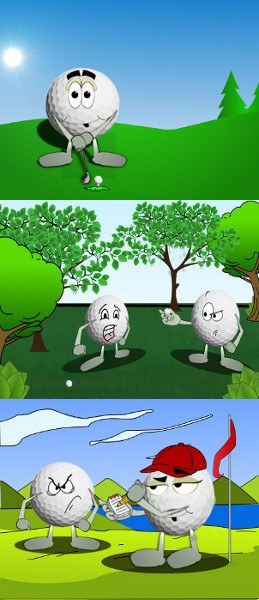
Golf Rule 1, The Game - Simplified Version
1-1. General definition of golf as a game of hitting a ball with a club, starting on the teeing ground and proceeding until the ball is in the hole.
1-2. Players cant change the position or movement of a ball in play. Players aren't allowed to physically alter the golf course.
Exceptions: If another rule allows the player to change the balls position or movement, or to alter the course, the player is allowed to do so under the other rule. Also, the player may alter the playing ground if the only purpose is course care (as opposed to gaining a playing advantage).
Example: While its against the rules to tamp down a spike mark in your putting line (or a partners or competitors), you may do so, after holing out, in the interest of helping those playing behind you.
Penalties for violating Rule 1-2: A two-stroke penalty in stroke play, loss of the hole in match play.
1-3. Players may not change or disregard any rule or penalty; they must play by the rules as written.
Penalties for violating Rule 1-3: All players involved in the violation are disqualified in stroke and match play.
1-4. If players have a dispute that isn't covered by the rules, fairness should guide their decision on how to proceed.
Example: A golfer finds his ball in a birds nest (but not in a hazard), a situation the rules don't specifically cover. Not wanting to damage the nest, the golfer and his partner/competitor must decide how he should proceed. Fairness dictates that the golfer should be allowed to drop his ball way from the nest, at the nearest point of relief, without adding a penalty stroke.
1-1. General
The Game of Golf consists of playing a ball with a club from the teeing ground into the hole by a stroke or successive strokes in accordance with the Rules.
1-2. Exerting Influence On Movement Of Ball Or Altering Physical Conditions
A player must not (i) take an action with the intent to influence the movement of a ball in play or (ii) alter physical conditions with the intent of affecting the playing of a hole.
Exceptions:
1. An action expressly permitted or expressly prohibited by another Rule is subject to that other Rule, not Rule 1-2.
2. An action taken for the sole purpose of caring for the course is not a breach of Rule 1-2.
*PENALTY FOR BREACH OF RULE 1-2:
Match play – Loss of hole; Stroke play – Two strokes.
*In the case of a serious breach of Rule 1-2, the Committee may impose a penalty of disqualification.
Note 1: A player is deemed to have committed a serious breach of Rule 1-2 if the Committee considers that the action taken in breach of this Rule has allowed him or another player to gain a significant advantage or has placed another player, other than his partner, at a significant disadvantage.
Note 2: In stroke play, except where a serious breach resulting in disqualification is involved, a player in breach of Rule 1-2 in relation to the movement of his own ball must play the ball from where it was stopped, or, if the ball was deflected, from where it came to rest. If the movement of a player’s ball has been intentionally influenced by a fellow-competitor or other outside agency, Rule 1-4 applies to the player (see Note to Rule 19-1).
1-3. Agreement To Waive Rules
Players must not agree to exclude the operation of any Rule or to waive any penalty incurred.
PENALTY FOR BREACH OF RULE 1-3:
Match play – Disqualification of both sides;
Stroke play – Disqualification of competitors concerned.
(Agreeing to play out of turn in stroke play – see Rule 10-2c)
1-4. Points Not Covered By Rules
If any point in dispute is not covered by the Rules, the decision should be made in accordance with equity.






